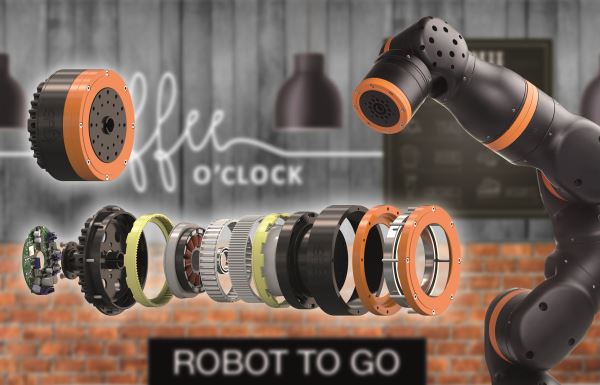Service robots can now be found across the globe across a broad range of sectors including hospitality, healthcare, agriculture and logistics.
These lightweight collaborative robots are helping workers by automating monotonous or non-ergonomic tasks.
To help streamline the operation, igus, a global leader in automation solutions, has unveiled a new cost-effective modular gearbox kit for cobots.
On display at this year’s Hannover Trade Show in Germany, the fully integrated tribo strain wave gear with motor, absolute-value encoder, force control system and controller is the main component of this kit.
"With our Low Cost Automation solutions, we enable design engineers to cost-effectively take part in the future of service robotics", says Stefan Niermann, who is responsible for the area of Low Cost Automation in the extended igus management structure.
"This opens up space for new ideas in the area of automation: robots that can dispense coffee in retail shops or clear out the dishwasher at home. Cobots, that can be used in the area of nursing as well as in industry – and everything made in Germany."
The gearboxes play an especially important role in this context as they are the heart of any modern robot.
Compact design
Friction and wear are optimised by means of lubrication-free tribo-polymers. The use of plastics enables an extremely compact design and cost-effective production.
The drygear strain wave gear can be used along the last axis of an articulated arm, linear robot or delta robot, for example, in front of different gripper systems.
The new modular gearbox kit supplements the wide range of igus products in the area of Low Cost Automation.
Available in Australia from Treotham Automation, the modular gearbox kit comes in sizes 80 and 105.
In the gearbox, a tribo wave generator and a tribo flex ring with external teeth, as well as a brushless DC motor with external rotor are used.
On the basis of the gearbox, an individual robot can also be designed as a cobot with the help of joining links, thanks to the additional electronic components.
Advantages of lightweight robots
"For our lightweight strain wave gears, we see market opportunities in robots whose total weight is less than 8kg", explains Alexander Mühlens, head of Low Cost Automation at igus.
"This is because, where robotics in Low Cost Automation is concerned, the self weight is always important and not only the payload and a low price,” Mühlens says.
“Lightweight robots are easier to transport and can be used more efficiently on driverless transport systems, on 7th robot axes or, in the near future, even on drones."
The low weight is also a significant advantage when the systems are used in cobots, as smaller masses mean that lower forces are generated when collisions occur.
HRC capabilities are possible thanks to the electronic components in the fully integrated strain wave gear.
And with new encoder technology, forces as well as torque can be determined and safely limited by means of the motor current.
More cost-effective
For this purpose, igus relies on a double encoder, in which a measurement is carried out in front of and behind the joint in order to detect forces and torque levels and react accordingly.
The new fully integrated strain wave gearboxes are to be used this year in the new version of the ReBel, the igus service robot.
As a result, this generation of robots will be considerably slimmer – and with the inclusion of integrated BLDC motors with power electronics – they will be more cost-effective.
The ReBeL should be able to carry 2kg, have a range of up to 650mm, as well as a self weight of less than 10kg and a minimum running time of two million cycles.
Contact Treotham Automation for more information.
Treotham Automation Pty Ltd
1300 65 75 64


